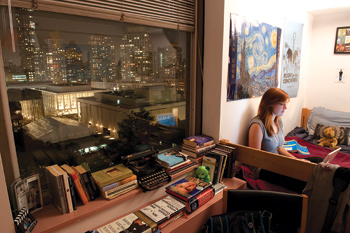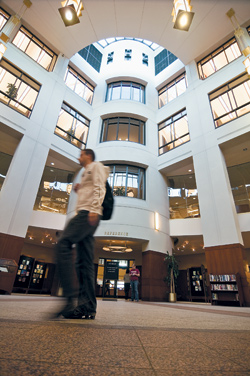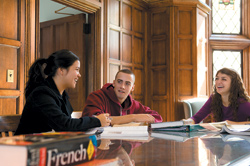Undergraduate Education 2009-2010
The Office of the Provost’s Annual Report for 2009-2010 sets out the year’s accomplishments in relation to the academic goals of the University, progress on the strategic initiatives articulated in Toward 2016 and challenges faced by the academic units of the University. Toward 2016emphasizes undergraduate education as a path to preeminence in Catholic higher education. Fordham indeed made significant strides in the previous academic year, one indication of which was its rise five places in the latest edition of U.S. News & World Report’s“America’s Best Colleges” issue. Fordham ranks at No. 56 among the 262 most prestigious national—or “top-tier”—universities, a dramatic rise from 84th place in 2002.
Fordham either began or continued initiatives in a number of areas over the last year. This report highlights activities and issues that fall loosely into five categories: faculty development, curriculum and teaching development, development of international initiatives, student academic development and academic leadership development.
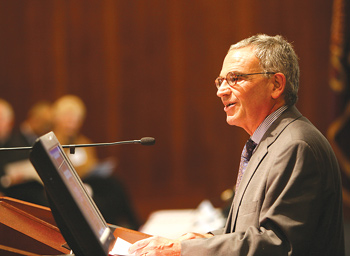
Photo by Bruce Gilbert
Faculty Development
Faculty Hiring and Performance
Fordham hired 12 new tenured and tenure-track faculty, 10 visiting faculty, and 14 instructional staff members in the 2009-2010 academic year. Faculty research is rising as a result of the sustained emphasis on academic achievement in all hiring searches.
This year, arts and sciences deans plan to build on the University-wide structure for faculty mentoring, especially junior faculty. The dean of the faculty of arts and sciences will continue to work with deans and department chairs to review the needs and direction of the mentoring process. Arts and sciences also invites senior faculty from outside departments to serve as mentors for junior colleagues throughout the year.
Curriculum and Teaching Development
The first set of Eloquentia Perfecta I (EP I) seminar courses, part of the new undergraduate liberal arts core curriculum, debuted in 2009. A total of 77 EP I courses were offered during the year, taught by 65 faculty. The faculty were supported by the work of the Center for Teaching Excellence (CTE), which has continued to offer EP Seminars designed to assist faculty developing EP courses. In addition to the 62 faculty who completed the seminar in 2008-2009, an additional 59 faculty participated in 2009-2010.
The arts and sciences core curriculum committee worked with the Gabelli School of Business (formerly the College of Business Administration) and Fordham College of Liberal Studies on alterations to the core curriculum in order to better serve those student populations. The Office of the Provost formed a core curriculum implementation support group to address implementation challenges with the new Banner system, and the projection of faculty staffing and resources necessary for full implementation over the next three years.
The Gabelli School of Business made fundamental and sweeping changes to the business core curriculum. Using the new liberal arts core as its starting point, the business core is designed to meet four additional goals: develop unique and innovative programs; attract and retain highly gifted students; train ethical and compassionate business leaders; and develop stronger and deep ties with GSB alumni in the corporate world. Integral to the new business core is embedding assessment of goals into individual courses. Full implementation of the new business core is anticipated by the 2012-2013 academic year.
New Undergraduate Degree and Certificate Programs
Development of new degree and certificate programs continued in 2009-2010, with an emphasis on ensuring those programs were consistent with the University’s strategic goals. Fordham College at Rose Hill launched the interdisciplinary environmental science program that includes coursework from multiple science departments, and received approval for an engineering physics minor—which complements the existing physics major. The engineering physics minor will be particularly appealing to students pursuing the architecture track within the visual arts major. FCRH also sponsored a successful interdisciplinary science seminar, bringing together faculty from several fields to promote curricular advances.
The University previously approved a minor in international humanitarian affairs at Fordham College at Lincoln Center and began this with a focus on Central America. Fordham College of Liberal Studies (FCLS), in consultation with the Gabelli School of Business, developed a new major in business at the Westchester campus. For the coming year, FCLS will focus on developing programs and certificates in partnership with other schools of the University.
Reaccreditations and Assessment
The University began preparations for a five-year Middle States periodic review with the creation of a Middle States periodic review task force. In 2009-2010, the task force established a timeline for collecting and collating information necessary for drafting the periodic review report, which will focus on the four Middle States recommendations from the 2006 self study. A first draft of the report has been completed, and a final draft will be submitted to Middle States in spring 2011.
Partnerships and Centers
Fordham continued to expand its academic partnerships, affiliations, and centers of research and service in the 2009-2010 year. Of particular note is the London Centre’s participation in the Association of Jesuit Colleges and Universities’ Consortium on Study Abroad, a collaboration of six of the University’s ten college and schools.
The University also widened its participation in partnerships and affiliations locally and nationally. Fordham’s academic partnership with Albert Einstein College of Medicine (AECOM), established in fall 2008, continues to grow: six FCRH students in science and mathematics held research positions at AECOM over the past year, and the Office of the Provost is exploring initiatives to enrich faculty collaboration.
Fordham College at Lincoln Center (FCLC) is working toward joint programming with the Juilliard School. William F. Baker, Ph.D., the Claudio Aquaviva Chair and Journalist in Residence at GSE, taught the first joint course of FCLC and Juilliard students in spring 2010.
Two new centers were established under the Department of Biological Sciences: the Center for Cancer, Genetic Diseases and Gene Regulation, focusing on multidisciplinary approaches to research questions; and the Center for Conservation, Evolution and Urban Ecology, supporting research and training programs, and promoting collaboration among scientists at Fordham and regional institutions, such as the New York Botanical Garden and the Wildlife Conservation Society/ Bronx Zoo.
The research and instructional capacity of the Louis Calder Center-Biological Field Station will increase. The University broke ground on an additional greenhouse and a 3,800-square-foot facility that will house graduate students. The expansion of Calder’s facilities increasingly supports not only the research of Fordham scientists and students but also that of its numerous partners, including the Wildlife Conservation Society, the New York Botanical Garden, the Teatown Lake Reservation, the U.S. Geological Survey and the State of New York.
International Initiatives
The University continued its focus on international programs in 2009-2010 through partnership and programmatic development in London, Beijing and Pretoria. Initiatives in Asia and Africa were largely confined to graduate education, and will be covered in a separate report.
Fordham’s London Centre at Heythrop College has become a full-fledged study abroad program and third-party provider, offering both year-long and semester-long academic programs. With the establishment of the Association of Jesuit Colleges and Universities (AJCU) Consortium of Study Abroad Programs, the London Centre now serves as the gateway to study abroad in the United Kingdom for Fordham students and for an extended network of 28 Jesuit colleges and universities in the United States. The Gabelli School of Business spring and summer programs and the Fordham liberal arts summer session have shown growth in enrollment. New curricular planning and marketing initiatives are underway to help increase the visibility and enrollment of all the programs offered at Fordham’s London Centre.
One undergraduate initiative in Africa was the International Business Service Learning Project, which sent eight Gabelli School of Business students to Kenya during the 2010 spring break to study microfinance as an economic model, to disburse two small business loans, and to assist recipients by designing marketing plans for their small startup businesses. The loans were funded by profits from a fair trade campus business that the students have been running for more than three years at Fordham.
Office of International Initiatives
The Office of International Initiatives continued to coordinate the development and implementation of new programs and international partnerships across the schools and colleges of the University. In 2009-2010, the office completed a three-year inventory of Fordham’s international agreements and offered a new search engine that catalogs Fordham’s global presence by country. In 2009-2010, the University entered into nine new affiliations supporting faculty and student exchange and research.
Internationalizing the Campus and Curriculum
The St. Edmund Campion Institute for the Advancement of Intellectual Excellence summer fellowship program is among many initiatives in 2009-2010 to internationalize the campus and the curriculum. Through the Campion Institute, undergraduate and graduate students were able to attend the emerging markets program in South Africa, jointly sponsored by Fordham and the University of Pretoria.
Finally, Fordham College at Rose Hill is working on ways to increase opportunities for students to study abroad, and to offer students greater exposure to international curricula and more study tools.
Student Academic Development
Research Opportunities
This year 198 students presented original research across25 different majors and programs at the Fordham College at Rose Hill Undergraduate Research Symposium and the Fordham College at Lincoln Center fall and spring Research Fairs. The FCRH Undergraduate Research Symposium was significantly expanded, including social sciences and humanities for the first time. Ten conference presentation sessions were also added to the poster sessions, giving students a choice of presentation formats. A total of 151 students participated in the symposium, presenting research related to 113 different projects through 29 oral presentations and 84 posters. Faculty participation was very high, with 54 mentors involved. Funding for the FCRH summer undergraduate research program increased 76 percent to $143,000 and resulted in a 54 percent increase in the number of students receiving awards. Ten FCRH students conducted research at partner institutions (Albert Einstein College of Medicine, WCS/Bronx Zoo, and NYBG).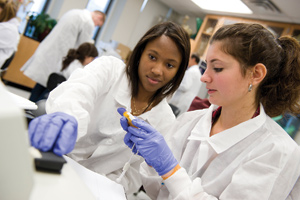
The Gabelli School of Business (GSB) inaugurated its student managed fund, which provides real-world training to 30 students in financial modeling, research and portfolio management; $1,000,000 in University endowment funds have been made available to support the program. Five GSB Boyle scholars collaborated with faculty on research-driven projects, and six students participated in the honors thesis program.
Thirty Collegiate Science and Technology Entry Program (CSTEP) students served as research assistants and interns in the chemistry and physics departments, and in off-campus science and non-science internships. Twenty-five CSTEP students participated in paid internships that provided supervised training in research methods.
The Campion Institute supported summer awards that provided students access to cutting-edge laboratory research and contributed to four undergraduate science students being awarded National Science Foundation Research Experience for Undergraduates summer fellowships.
Integrated Learning Communities, Honors and Service Learning
In 2009-2010, integrated learning communities (ILCs) at Fordham College at Rose Hill, Fordham College at Lincoln Center and the Gabelli School of Business experienced another year of strong growth in participation and quality of programming. The FCRH Manresa program completed its third year with 156 students enrolled, and the two science integrated learning communities served 65 freshmen and 59 upper-level students. FCLC’s first year experience combined aspects of an integrated learning community with outreach to commuting freshmen.
The GSB faculty, along with the director of honors opportunities, continued to develop and implement the four-year Global Business Honors Program as a magnet to attract highly gifted students who otherwise would not attend Fordham. This student population is culturally, geographically and ethnically diverse, and has an average SAT of 1430. In addition to small, rigorous honors classes, student opportunities include site visits, corporate team building exercises, alumni mentoring and annual global travel that builds upon their business education. The first cohort will graduate in 2011.
The number of ILCs will expand in the coming year as FCRH and GSB completed collaboration with Student Affairs, Campus Ministry, and current students on the development of the new integrated learning community for Ignatian leadership and service (the West Wing) for 45 students. The new Campbell and Salice-Conley residential halls feature academic programming and house 450 students.
Service learning, a major initiative of Jesuit institutions and one of the goals of the new liberal arts core curriculum, added interdisciplinary seminars. FCRH provided two interdisciplinary seminars and nine service-learning courses during the year; a total of 155 students, 26 faculty, and 22 community partners participated. GSB expanded its international service learning program, enabling students to provide consulting advice to three Kenyan villages and to supervise three micro loans. Fifty-four GSB students participated in service learning, providing 2,100 hours of service to nineteen different agencies. Complementing this work is the integration of service learning into the FCRH Honors Program. The program serves nearly 150 students per year, running 22 small honors courses every semester.
Noteworthy Student Achievements
The Campion Institute mentored a total of 189 applicants (students and alumni) who applied for 243 awards, earning a total of 125. Another 28 applicants were named finalists or alternates. Among these were a number of firsts in student achievement: Fordham College at Lincoln Center has its first Truman Scholar, Joseph Carnevale, Class of 2011 and the University’s first Cambridge University International Scholars PhD Award, Mohammad Usmani, Class of 2010; Fordham College of Liberal Studies had its first Fulbright Fellowship alternate, Sandra Choi, Class of 2010; and a record seven students were named finalists for New York City Urban Fellowships, three of whom received awards.
Campion’s work with minority and disadvantaged students through the CSTEP program was fruitful, as five CSTEP students were accepted to medical school, three to law school, one to a master’s in chemistry program; one student was a Fulbright finalist, and another was selected as a Coro Fellow.
Other noteworthy student achievements include: Joseph Vignone, FCLC Class of 2011, winning first place in the Elie Wiesel Ethics Essay Contest; roles in the Broadway hits, La Cage aux Folles andWest Side Story, for two FCLC 2010 graduates, Sean Carmon and Christian Elán Ortiz; and a presentation by Charles Cerbini, FCRH Class of 2010, at the 2010 American Zoological Association conference on the successful research he worked on with Alan Clark, Ph.D., and the Wildlife Conservation Society.
Acceptances of Fordham students to graduate and professional schools continue to outpace both national averages (45.7 percent) and the internal Toward 2016 goal (75 percent). The fall 2009 FCRH acceptance rate for U.S. medical schools was 76.2 percent and the FCLC rate was 83.3 percent. The acceptance rates for non-U.S. and other health professional schools were 84.2 percent and 100 percent, respectively. Acceptances to U.S. law schools were 73.9 percent and 62.2 percent, respectively.
Ongoing Initiatives and Programmatic Improvements
The Office of the Provost is focused on the following programmatic goals for 2010-2011 that support the University’s achievement of Toward 2016:
Develop International Initiatives and University Partnerships
• Focus on developing and promoting three key sites: Fordham London Centre, Fordham Beijing (and China more broadly), and Fordham Pretoria.
• Develop London and Beijing programs to serve as hubs for Fordham students, students from other AJCU schools, and for strengthening connections with Fordham alumni in Europe and China.
• Grow Fordham’s London Centre, expanding on current programs and implementing new semester-length arts and sciences and business programming in London.
• Support the articulation of memoranda of agreement between the deans of Fordham schools and their counterparts at the University of Pretoria.
Support faculty engagement in University partnerships with New York institutions and encourage the development of joint certificate and degree programs with:
• Albert Einstein College of Medicine/Yeshiva University
• The United Nations
• The Wildlife Conservation Society
• The New York Botanical Garden and
• The City of New York
Develop Strengths in the Sciences
• Strengthen curriculum in the sciences at all levels through an integrated approach incorporating partnerships, strategic faculty hiring, student and junior faculty mentoring and research initiatives.
• Foster opportunities for undergraduate research.
• Encourage development of new avenues for interdisciplinary study in the sciences.
Develop Innovative Curricular Programs
• Strengthen integrated learning communities, providing support to the undergraduate deans in their development of curricular experiences that foster interdisciplinary, interactive learning and community-building.
• Further develop first-year advising, as well as honors programs to support gifted and motivated students.
Develop a Distinguished Faculty
• Identify and support programs and resources that strengthen research at Fordham.
• Assess hiring needs in relation to academic, curricular priorities, drawing on data-modeling resources.
• With the deans of faculty, continue to develop more comprehensive and systematic mentoring for junior faculty members.
• Work with the Faculty Senate’s faculty development committee and build on its groundwork for increasing faculty development activities and structures at Fordham.
• Continue to develop the infrastructure and programming of the Center for Teaching Excellence in support of faculty development.
Support the Growth of Fordham Westchester
• Continue to encourage the expansion of existing and new market-ready programs at the Westchester campus.
• Include the Westchester campus’s programs in integrated marketing initiatives.

